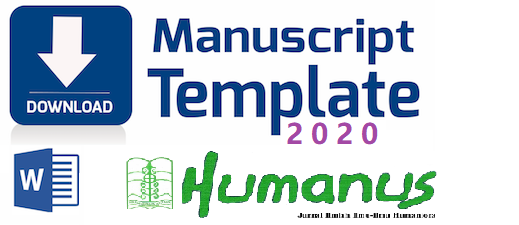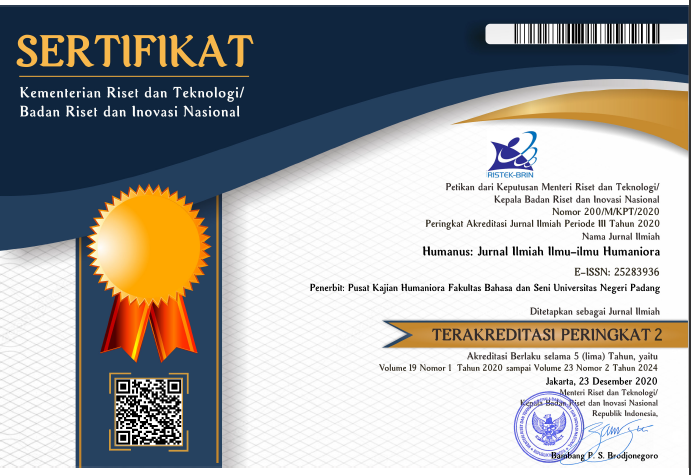Drama as a Tool of Social Conflict Management: “Jalan Asmaradana” Performance Project
 ), Hanafi Hussin(2),
), Hanafi Hussin(2), (1) Universitas Singaperbangsa Karawang
(2) University of Malaya
 Corresponding Author
Corresponding Author
Copyright (c) 2022 Humanus
DOI : https://doi.org/10.24036/humanus.v21i1.113189
Full Text:
 Language : en
Language : en
Abstract
This study examines the process of the drama staging project "Jalan Asmarandana" adapted from the short story by Kuntowijoyo. The research problem concerns, how can drama become a tool for social conflict management? as for the object of analysis in the form of process data for the drama staging project "Jalan Asmarandana" by students in the fifth semester of the 2018 academic year, the Indonesian Language and Literature Education study program, Faculty of Teacher Training and Education, University of Singaperbangsa Karawang. The theory used in analyzing the data is Dorothy Heathcote's theory, as a theory of conflict resolution approach, namely as-if experience, reflection, and negotiation. The method used is descriptive qualitative method. The results of the research students might feel like they are someone else with the as-if experience training project, and it has been offered multiple views on an issue encountered by students through the roles they play. Reflection teaches us that life is a sequence of experiences tinted by life's issues at all times. Drama is a reflection of life. Finally, negotiation training gives students indirect experience with how to communicate, collaborate, and discuss with a group, particularly the drama production team.
Keywords
References
Ali, A. M. D., & Yusof, H. (2011). Quality and qualitative studies: The case of validity, reliability, and generalizability. Issues in Social and Environmental Accounting, 5(1/2), 25-26
Basri, H. (2014). Using qualitative research in accounting and management studies: not a new agenda. Journal of US-China Public Administration, October 2014, Vol.11, No.10, 831-838. DOI: 10.17265/1548-6591/2014.10.003
Baumeister, R. F., & Leary, M. R. (1997). Writing narrative literature reviews. Review of General Psychology, 1, 311–320. https://doi.org/10.1037/1089-2680.1.3.311.
Bolton, G. (1984). Drama as education: An argument for placing drama at the centre of the curriculum. London: Longman.
Capobianco, S., Davis, M., and Kraus, L. (2001). “Conflict Dynamics Profile—CDP 360 Slide Show”. www.conflictdynamics.org/cdp/download.php.
Courtney, R. (1980). The dramatic curriculum. New York: Drama Book Specialists.
Courtney, R. (1989). Play, drama and thought: The intellectual background to dramatic education (4th ed.). Toronto: Simon & Pierre.
Daniels, L., & Parkinson, S. (1976). Role X’ing and moral education: Some conceptual speculation. Educational Theory, 26, 329–336.
Deutsch, M., and Coleman, P. (eds.). (2000). The Handbook of Conflict Resolution. San Francisco: Jossey-Bass.
Friedman, P., & Yarbrough, E. (1985). Training Strategies From Start to Finish. Englewood Cliffs, NJ: Prencite-Hall.
Gardner, H. (1989). Multiple Intelligence: The theory in practice. New York, NY: Basicbooks.
Gardner, H. (1991). The Unschooled Mind. New York: HarperCollins.
Goldstein, Thalia & Wu, Katherine & Winner, Ellen. (2009). Actors are Skilled in Theory of Mind But Not Empathy. Imagination, Cognition and Personality. 29. 115-133. 10.2190/IC.29.2.c. https://www.researchgate.net/publication/247871626
Heathcote, Dorothy. (1984a). Drama and learning. In L. Johnson & C. O’Neill (Eds.), Dorothy Heathcote: Collected writings on education and drama (pp. 90–102). London: Hutchinson. (Original work published 1975)
Heathcote, Dorothy. (1984b). Dramatic activity. In L. Johnson & C. O’Neill (Eds.), Dorothy Heathcote: Collected writings on education and drama (pp. 54–60). London: Hutchinson. (Original work published 1969)
Heathcote, Dorothy. (1984c). Improvisation. In L. Johnson & C. O’Neill (Eds.), Dorothy Heathcote: Collected writings on education and drama (pp. 44–48). London: Hutchinson. (Original work published 1967).
Heathcote, Dorothy. (1984d). Subject or system. In L. Johnson & C. O’Neill (Eds.), Dorothy Heathcote: Collected writings on education and drama (pp. 61–79). London: Hutchinson. (Original work published 1971).
Hornbrook, D. (1991). Education in drama: Casting the dramatic curriculum. London: Falmer Press.
İncebacak, B. B., Ersoy, E., & İncebacak, E. (2015). Effect Of Creative Drama Course On Creative Problem Solving Skills. International Academic Conference on Teaching, Learning and E-learning(IAC-TLEl). www.researchgate.net/profile/Belgin_Bal_Incebacak/publication/284167227
Koyluoglu, N. (2010). Using Drama in Teaching En- glish for Young Learners. Retrieved from: http://acikerisim.selcuk.edu.tr:8080/xmlui/bitstream/handle/123456789/6563/264387.pdf?sequence=1&is.
McCaslin, Nellie. (1996). Creative Drama in the Classroom and Beyond. London, Longman Publishers.
McCusker, K., & Gunaydin, S. (2015). Research using qualitative, quantitative or mixed methods and choice based on the research. Perfusion. DOI: 10.1177/0267659114559116
Mohamed, Z. M., Abdul Majid, A. H., & Ahmad, N. (2010). Tapping new possibility in accounting research, in qualitative research in accounting, Malaysian case. Penerbit Universiti Kebangsaan Malaysia, Kuala Lumpur, Malaysia.
Moore, M. (2004). Using Drama As An Effective Method to Teach Elementary Students. (Senior Honors Thesis). Re- Trieved From: Http://Commons.Emich.Edu/Honors/11.
Nurhasanah, Een, Uah Maspuroh, Rina Marlina And Mohd Norazmi Bin Nordin. (2021). Arifin C. Noor’s Drama “Matahari Di Sebuah Jalan Kecil” As A Media For Literature Learning In Senior High School: A Study Of The Structure And Psychological Value. Psychology and Education (2021) 58(2): 11315-11328 ISSN: 00333077.
Nurhasanah, Een, Uah Maspuroh, Nia Pujiawati and Mohd Norazmi Bin Nordin. (2021). Socio-Economic Study: Middle Class Society Portraits in Drama “Sayang Ada Orang Lain” By Utuy Tatang Sontani. Multicultural Education. Volume 7, Issue 2, 2021. 10.5281/zenodo.4630797
Reiff, J. (1992). What Research Says to the Teacher: Learning Styles. Washington, DC: National Education Association.
Rowe, M., and Baker, M. (1984). “Are You Hearing Enough Employee Concerns?” Har- vard Business Review, 62, 127–136.
Runde, Craig E. and Tim A Flanagan. (2007). Becoming a conflict competent leader : how you and your organization can manage conflict effectively. ISBN-13: 978-0-7879-8470-0 (cloth) ISBN-10: 0-7879-8470-1 (cloth). United States of America.
Sale, M. J., Lohfeld, L. H., & Brazil, K. (2002). Revisiting the quantitative-qualitative debate: Implication for mixed-method research. Quality and Quantity, 36(1), 43-53.
Slade, P. 1954. Child drama. London: University of London Press.
Snyder, Hannah. (2019). Literature review as a research methodology: An overview and guidelines. Journal of Business Research 104 (2019) 333–339. https://doi.org/10.1016/j.jbusres.2019.07.039.
Sofaer, S. (1999). Qualitative methods: what are they and why use them?. Health Services Research 34:4 Part II (December 1999).
Somers, J. (2013). Drama in the curriculum. London: Cassell.
Srivastava, A. & Thomson, S.B. (2009). Framework analysis: a qualitative methodology for applied policy research. JOAAG, Vol.4. No.2
Tranfield, D., Denyer, D., & Smart, P. (2003). Towards a methodology for developing evidence-informed management knowledge by means of systematic review. British Journal of Management, 14, 207–222. https://doi.org/10.1111/1467-8551.00375.
Ury, W., Brett, J., and Goldberg, S. Getting Disputes Resolved. San Francisco: Jossey-Bass. (1988).
Ustundag, T. 1997. The advantages of using drama as a method of education in elementary schools. Ankara: Hacettepe University.
Verriour, P. (1994). In role: Teaching and learning dramatically. Ontario: Pippin Publishing.
Way, B. (1967). Development through drama. London: Longman.
Wagner, B.J. (1976). Drama as a learning medium. Washington DC: National Education Association.
Webster, J., & Watson, R. T. (2002). Analyzing the past to prepare for the future: Writing a literature review. Management Information Systems Quarterly, 26, 3.
Zafeiriadou, N. (2009). Drama in Language Teaching: A Challenge for Creative Development. Issues, 23, 4-9.
 Article Metrics
Article Metrics
 Abstract Views : 269 times
Abstract Views : 269 times
 PDF Downloaded : 65 times
PDF Downloaded : 65 times
Refbacks
- There are currently no refbacks.
Copyright (c) 2022 Humanus

This work is licensed under a Creative Commons Attribution-NonCommercial 4.0 International License.









